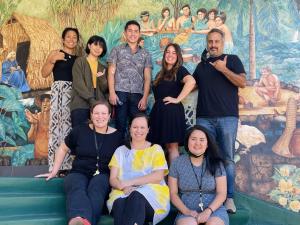$4.6M anonymous gift boosts UH Center for Indigenous Innovation and Health Equity
University of HawaiʻiAVP of Communications, UH Foundation
Janis Magin, (808) 376-7877
Director of Communications, UH Foundation
Link to broll of UH System research: https://bit.ly/2DTUKsa
A new University of Hawaiʻi initiative that aims to advance Indigenous innovation as a tool for health equity in Native Hawaiian and Pacific Islander populations received an anonymous $4.6 million gift.
The UH Center for Indigenous Innovation and Health Equity (CIIHE) was established with a $1 million grant in 2021 from the U.S. Department of Health and Human Services’ Office of Minority Health. The latest $4.6 million gift will fund the center’s first endowed chair and provide funding for programs and activities to advance their work.
“This gift validates and affirms our work to restore and improve the health of our Native Hawaiian and Pacific Islander communities,” said Kamuela Enos, director of the UH System Office of Indigenous Innovation and the project’s principal investigator. “We are deeply grateful for the support and recognition for our program and the incredible potential it has to lift up our Indigenous communities.”
When thinking about the term “Hawaiian culture,” Enos has begun to use the phrase “ancestral sciences and technologies calibrated for integrated biosystems management.” This paradigm shift positions Indigenous practices as sites of innovation, applying traditional knowledge and practices to address contemporary problems.
Research has shown that cultural loss and the severing of Indigenous peoples from their traditional and collaborative place-based practices are key contributors to significant health disparities such as chronic disease and poverty. Native Hawaiians and Pacific Islanders have a higher prevalence of such chronic conditions as obesity, diabetes and cardiovascular disease and tend to have higher death rates from cancer.
“The University of Hawaiʻi is extremely grateful for this generous gift that will help to ‘move the needle’ on existing and future efforts by our Center for Indigenous Innovation and Health Equity,” said UH Vice President for Research and Innovation Vassilis L. Syrmos. “Helping to improve the health and way of life for our residents, especially those in the Native Hawaiian and Pacific Islander communities, is one of the key focal points in our research and innovation efforts at UH.”
Improving health through traditional practices
Applying traditional Indigenous knowledge and practices has already demonstrated promising results toward improving health for members of this community. For example, studies have shown the potential of organic farming for youth, traditional dance such as hula, and an increase in Native language fluency to have positive health outcomes. Many other promising practices exist and warrant further identification and study.
“In year one of our CIIHE grant, we invested in building our team and collaborated with community leaders to develop an Indigenous framework for our initiative,” said Aimee Malia Grace, director of the UH System Office for Strategic Health Initiatives and co-lead of the initiative. “We also completed a landscape analysis survey with nearly 50 respondents from Hawaiʻi and the U.S.-Associated Pacific Islands to help us identify Indigenous innovations with the potential for positive health outcomes.”
In year two of the initiative, CIIHE plans to leverage its diverse staff (consisting of Johnny Aldan, Shanda Delos Reyes, Sharde Freitas and Ikaika Ramones) to advance these Indigenous innovations to improve health equity by focusing on three pillars—research initiatives, policy strategies and economic development initiatives that are all co-produced with community.
In addition to Enos and Grace, the center’s leadership team is composed of Alika Maunakea, associate professor leading Indigenous-informed biomedical research underlying health disparities at the UH Mānoa John A. Burns School of Medicine (JABSOM) Department of Anatomy, Biochemistry and Physiology; Marjorie Leimomi Mau, director and principal investigator at the JABSOM Center for Native and Pacific Health Disparities Research; and core partner organizations Hauʻoli Mau Loa Foundation, a private foundation assisting a network of ʻāina-based organizations; MAʻO Farms; Hoʻoulu ʻĀina (Kōkua Kalihi Valley); the Edith Kanakaʻole Foundation; and Chaminade University.

